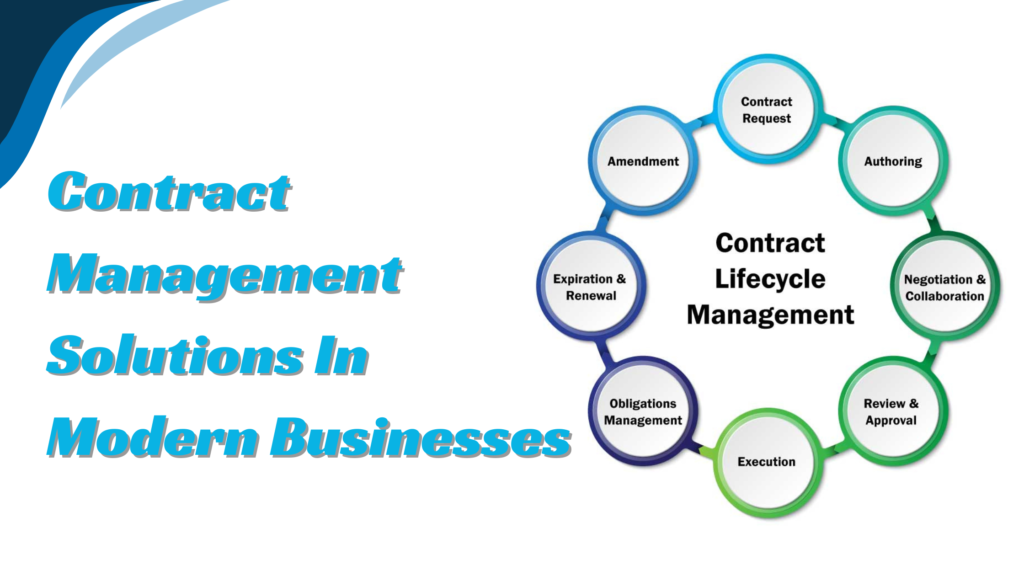- 1 What Are Contract Management Solutions?
- 2 Benefits of Contract Management Solutions in Business Operations
- 2.1 1. Centralized Repository:
- 2.2 2. Enhanced Collaboration:
- 2.3 3. Automated Workflows:
- 2.4 4. Risk Mitigation:
- 2.5 5. Cost Savings:
- 2.6 6. Compliance Adherence:
- 2.7 7. Data-driven Insights:
- 2.8 8. Scalability and Flexibility:
- 2.9 Integrating with Other Business Systems
- 2.10 The Future of Contract Management Software
The ability to efficiently handle huge contracts is crucial in today’s fast-moving business environment. Beyond formalities, contracts underpin business operations and influence sales, purchases, and other vital areas.
A contract management solution simplifies the complexities of handling various agreements. Such tools assure a business that it can manage many contracts, each with its terms and deadlines, and still keep up with the rhythm of business demands.
These solutions simplify the workflow within an organization to ensure that its obligations are met at the right time. This can also enhance organizational efficiency and strengthen business relationships.
What Are Contract Management Solutions?
A contract management solution is a system created to facilitate the management of a contract lifecycle from initiation to either renewal or completion. It permits businesses to put all contracts in one central repository with important dates, details, and more. Such systems save time and eliminate possible errors by automating much of the tedious work associated with contract management.
Benefits of Contract Management Solutions in Business Operations
One key benefit of online contract management solutions like Ironclad is its ability to streamline business processes. These solutions automate workflow to ensure seamless operations in approving contracts, amendments, renewals, and other documents. This will relieve employees of burdens, enabling them to focus more on strategic issues.
1. Centralized Repository:
Contract management solutions provide a centralized repository for storing all contracts and related documents. Instead of sifting through countless emails, file cabinets, or disparate systems, users can access contracts instantly from a single platform. This centralized approach improves visibility, ensures data integrity, and simplifies the search for crucial information.
2. Enhanced Collaboration:
Collaboration is essential in contract management, involving multiple stakeholders such as legal teams, procurement officers, and department heads. Contract management solutions facilitate seamless collaboration by allowing stakeholders to access, review, and edit contracts in real-time, regardless of location. Features like version control and audit trails ensure transparency and accountability throughout the contract lifecycle.
3. Automated Workflows:
Delays, bottlenecks, and human errors often plague manual contract processes. Contract management solutions automate repetitive tasks such as contract creation, approval workflows, and renewal reminders. By streamlining these processes, organizations can accelerate cycle times, reduce administrative burden, and minimize the risk of compliance violations.
4. Risk Mitigation:
Contracts contain vital terms, obligations, and deadlines that, if overlooked, can expose organizations to legal and financial risks. Contract management solutions help mitigate these risks by providing alerts for key dates, tracking compliance metrics, and enforcing standardized contract templates. Moreover, advanced features like artificial intelligence (AI) and machine learning (ML) can analyze contracts for potential risks, such as non-compliance with regulatory requirements or unfavourable terms.
5. Cost Savings:
Inefficient contract management practices can incur significant costs in time, resources, and missed opportunities. Organizations can achieve substantial cost savings over time by automating workflows, reducing errors, and optimizing contract terms. Additionally, contract management solutions enable better vendor management, allowing businesses to negotiate favourable terms, identify cost-saving opportunities, and avoid unnecessary expenses.
6. Compliance Adherence:
Regulatory compliance is a top priority for businesses across industries, with non-compliance carrying hefty penalties and reputational damage. Contract management solutions help ensure compliance adherence by centralizing contract data, standardizing processes, and providing audit trails for regulatory audits. Furthermore, these solutions enable organizations to stay updated on changes in laws and regulations, proactively mitigate compliance risks, and demonstrate due diligence to regulatory authorities.
7. Data-driven Insights:
Contracts contain valuable data that can provide insights into vendor performance, contract trends, and negotiation strategies. Contract management solutions leverage advanced analytics and reporting tools to extract actionable insights from contract data. By analysing contract metrics, organizations can identify opportunities for process improvement, optimize contract terms, and make informed business decisions.
8. Scalability and Flexibility:
As businesses grow and evolve, their contract management needs become more complex and dynamic. Contract management solutions offer scalability and flexibility to adapt to changing business requirements. Whether scaling operations globally, integrating with other enterprise systems, or customizing workflows, these solutions provide the agility needed to support business growth and innovation.
Integrating with Other Business Systems
Most contract management solutions can be easily integrated with other business applications, such as Customer Relationship Management (CRM) applications and Enterprise Resource Planning (ERP) systems. This would enable the easy sharing of data across departments. For example, the sales department would have details of contracts, helping them better manage customer relationships.
The Future of Contract Management Software
AI (Artificial Intelligence) and ML (Machine Learning) are some of the most significant contributors to automation in the contract management process, from drafting contracts to analyzing terms for better decision-making.
But guess what? The future is here. The best management software will provide these features, further simplifying your work and reducing errors.
Conclusion
Contract management solutions are becoming imperative to business today. They aid efficiency, minimize risks, allow better compliance, and assure business owners of online security.
As your business grows more prominent, getting a contract management tool is well worth it. Such a tool will be crucial in enabling you to deal with the complexities of contract administration.
